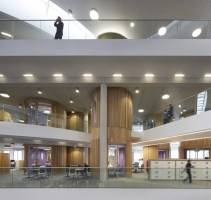October 10, 2015
UK’s best workplace? + Apple’s new office + Design and happiness 0
 In this week’s issue; Mark Eltringham says Jeremy Hunt’s views on the UK’s need to work longer hours does not make practical sense and explains why workplace design isn’t the only way to engage people. The Civic Centre & One Stop Shop in Keynsham, near Bath wins ‘Best of the Best workplace in the country’ in the BCO awards; Apple plans to add another tech palace alongside its Norman Foster designed campus in California; and a new survey finds that companies are rethinking the tools they use to keep employees loyal. Employers admit to an ad hoc approach to flexible working practices; millennials prefer value accelerated career paths and diversity over job security; and we preview a new Technology and Trends event. Visit our new events page, subscribe for free quarterly issues of Work&Place and weekly news here. And follow us on Twitter and join our LinkedIn Group to discuss these and other stories.
In this week’s issue; Mark Eltringham says Jeremy Hunt’s views on the UK’s need to work longer hours does not make practical sense and explains why workplace design isn’t the only way to engage people. The Civic Centre & One Stop Shop in Keynsham, near Bath wins ‘Best of the Best workplace in the country’ in the BCO awards; Apple plans to add another tech palace alongside its Norman Foster designed campus in California; and a new survey finds that companies are rethinking the tools they use to keep employees loyal. Employers admit to an ad hoc approach to flexible working practices; millennials prefer value accelerated career paths and diversity over job security; and we preview a new Technology and Trends event. Visit our new events page, subscribe for free quarterly issues of Work&Place and weekly news here. And follow us on Twitter and join our LinkedIn Group to discuss these and other stories.


























December 3, 2014
Focus on the wellbeing of the occupants of the office, not that of the building
by Maciej Markowski • Comment, Facilities management, Wellbeing, Workplace
(more…)